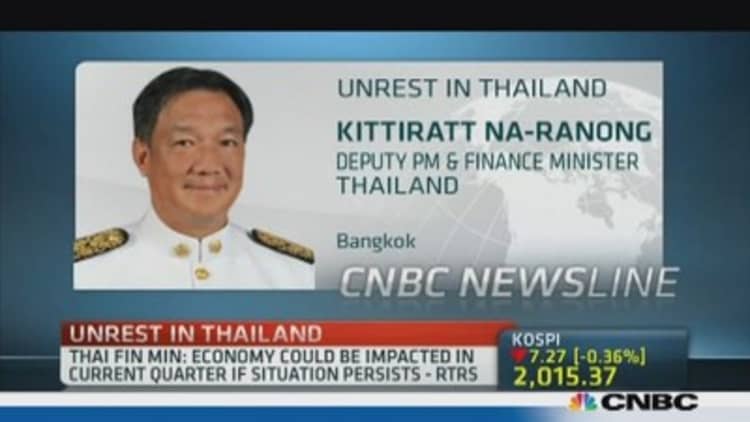The political protests centered in Bangkok have yet to chase Thailand's government from power, but they have spooked the central bank into a surprise rate cut amid fresh concerns about slowing economic growth.
The Bank of Thailand cut its benchmark interest rate Wednesday by 25 basis points to 2.25 percent, citing the hit to investor confidence from political protests and declining exports; it also lowered its 2013 growth forecast to 3 percent from 3.7 percent previously. In October exports fell 0.7 percent from a year earlier, after dropping 7.1 percent in September. Out of 16 economists polled by Reuters, only one had expected a rate cut.
The move to loosen monetary policy contrasts sharply with October's statement that the central bank wasn't concerned about growth, noted Santitarn Sathirathai, an economist at Credit Suisse.
(Read more: Spotlight on Thailand as political strife escalates)
"Clearly, something has changed dramatically in a month's time," he said.
Currently, protesters are occupying the Finance Ministry in Bangkok and are protesting outside other government offices in an attempt to cripple Prime Minister Yingluck Shinawatra's administration and force her ouster. Yingluck is expected to prevail in a no-confidence vote to be held Thursday.
"The concern is that if the protests spread beyond the Bangkok area, as seems to be the case today, this could prove disruptive to businesses. Moreover, if the protests turn violent, this may also lead to a greater uncertainty around the current government, which could further impact growth," said Sin Beng Ong, an economist at J.P. Morgan, in a note.
(Watch: Honeymoon period over for Thailand's PM: Pro)
The problem is particularly acute as the fourth quarter is seasonally strong for tourism, which has been a key driver of economic growth this year, Santitarn said.
"The trend has been very helpful for growth and that will come into question now that the political turmoil has hit," he said. "It could shave a bit off growth at a very bad time, when GDP growth is still very reliant on nonresident, i.e. tourist spending."
The decision to cut rates to spur growth contrasts with moves by other regional markets, including India and Indonesia, to hike their interest rates to prevent fund outflows amid expectations the U.S. Federal Reserve will soon begin to taper its asset purchases, noted Krystal Tan, an economist at Capital Economics, in a note.

(Read more: Fed sends markets tapering message)
"Thailand's current account deficit makes it likely to be targeted if investor sentiment shifts against emerging market assets. Prior to the rate decision, the currency was already one of Asia's worst performers in November," she said. The U.S. dollar is currently buying around 32.14 baht, up from around 31.58 baht early last week.
But Tan added, "currency depreciation would hardly be a disaster for Thailand, given its low foreign currency debt and decent foreign reserves. Currency weakness could even help bolster exports."
Foreign investors have pulled $4.14 billion out of Thai mutual funds for the year to November 20, outpacing even the $1.29 billion taken out of Indonesian funds over the same period, according to data from Jefferies.
But while Thai shares jumped on news of the rate cut, up around 1.1 percent in late trade, it's probably only a one-day wonder, said Santitarn.
"Unless we see more signs of growth recovery, it's hard to believe it will last," he said. "It's still the most important thing for the stock market going forward."
—By CNBC.Com's Leslie Shaffer; Follow her on Twitter @LeslieShaffer1

